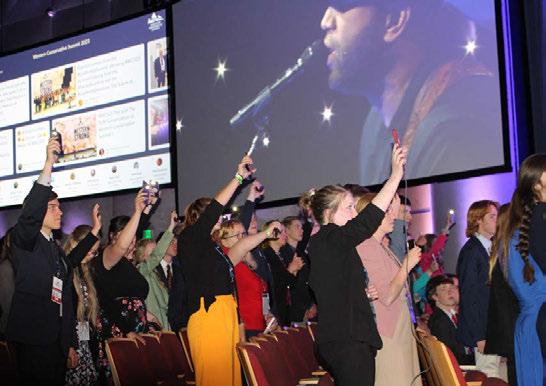
2 minute read
Common Sense Institute meeting looks at a wide range of issues
from 6-22-23 Villager
by The Villager
BY FREDA MIKLIN STAFF WRITER


On June 13, Common Sense Institute held its regular Eggs & the Economy breakfast meeting, where it delves into topics affecting Colorado businesses. This quarter’s meeting was called, “The Scramble,” because it covered multiple topics, including housing, employment statistics, legislation, and crime.
The event, which featured a panel consisting of Mayors Stephanie Piko of Centennial and Adam Paul of Lakewood, along with CSI Public Safety Fellow and former Denver Police Chief Paul Pazen, drew a full house of over 150 people to the AMG National Trust Bank in Greenwood Village.
Spotted in the crowd were business and non-profit icons Don & Linda Childears, political consultant Dick Wadhams, Mayors Mike Coffman of Aurora and George Lantz of Greenwood Village, Centennial City Council Members Christine Sweetland, Tammy Maurer, Mike Sutherland, Don Sheehan, and Mayor Pro Tem Rick Holt,
Aurora City Council Member Françoise Bergan along with 2023 city council candidates Stephanie Hancock and Jono Scott, Lone Tree City Council Member Wynne Shaw, South Metro Fire Board Member Rich Sokol, CSI Board Members Dave Davia from the Rocky Mountain Mechanical Contractors Association, and Robin Wise, president and CEO of Junior Achievement-Rocky Moun- that crime last year cost Coloradans $30 billion in “tangible and intangible” costs, but did not expound on how they were calculated. Byers pointed to increased car insurance premiums, saying he “tried to estimate” how much they had gone up due to widespread car theft and he “came up with around $500 million.” tain Inc. Even Myron Spanier from the Arapahoe County Republican Breakfast Club showed up to listen to the speakers.
This graph from CSI shows that the state’s Labor Force Participation Rate was approaching pre-pandemic levels last year. As of last month, it basically achieved that goal.
Byers next presented a chart showing that job growth in Colorado dropped precipitously when the COVID-19 pandemic began in early spring 2020, then picked up by mid-year, and rose steadily at a high rate until early 2022, when the rate tapered off to a slower, but still rising number, through May 2023.
CSI Executive Director Kelly Caulfield opened the program by talking about recent legislation, including SB23-303, Reduce Property Taxes and Voter-approved Revenue Change, a method to reduce 2023 residential property taxes due in 2024 and subsequent years, which will require voter approval of Proposition HH in November. Caulfield said CSI, “will not take a position,” on the ballot issue, but “will educate voters on the complexity of the measure” to help them understand how it will impact their property taxes and future TABOR refunds if approved.
CSI Senior Economist Steven Byers, Ph.D., started off the conversation by asserting
In a separate report, CSI reported that, between June 2022 and May 2023, our state had an unemployment rate of only 2.8%, while the national rate was 3.7% as of May 2023, thus the slower job growth rate appears to coincide with relatively full employment in our state.
Byers pointed out that Colorado’s Labor Force Participation rate (LFPR) of 68.7% is “near pre-pandemic level,” but noted it is “six percent below” what it was in the year 2008, the year with
Continued page 6







